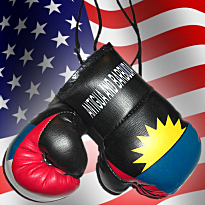 Confirming Wednesday’s rumors that Sen. Harry Reid (D-NV) had given up his attempts to attach an online poker provision to the divisive payroll tax/unemployment benefits extension legislation, the Las Vegas Review-Journal’s DC correspondent Steve Tetrault tweeted the following on Thursday afternoon: “Straight from @SenatorReid: #Webpoker is NOT in final payroll tax bill.”
Confirming Wednesday’s rumors that Sen. Harry Reid (D-NV) had given up his attempts to attach an online poker provision to the divisive payroll tax/unemployment benefits extension legislation, the Las Vegas Review-Journal’s DC correspondent Steve Tetrault tweeted the following on Thursday afternoon: “Straight from @SenatorReid: #Webpoker is NOT in final payroll tax bill.”
The hopes of US online poker players are now (for the moment) focused squarely on the Cybersecurity Act of 2012 that was introduced on Tuesday. The Hill’s Brendon Sasso reported Thursday that Reid will attempt to bring the Act directly to the Senate floor for a vote, precluding any committees from holding any markup or debate sessions – and possibly an attempt to stave off the type of grassroots campaigning that killed the much-reviled SOPA/PIPA internet oversight bills in January. Sen. John McCain (R-AZ) is protesting Reid’s gambit, insisting on committee input and threatening to introduce his own cybersecurity bill if such input isn’t granted.
While the US teeters on the brink of regulating online poker, the Caribbean nation of Antigua is pondering restarting its near-decade-old pursuit of justice at the World Trade Organization. In 2005, the WTO determined that the US campaign against international online gambling operators (many of them based in Antigua) contravened its free trade obligations, in that the US freely allowed domestic horse racing operations to conduct online wagering. That was followed in 2007 by a WTO order permitting Antigua to ignore US intellectual property rights, but only up to a value of $21m annually – a far cry from the $3.4b Antigua had been seeking.
Following the US Department of Justice’s revised stance on the scope of the Wire Act in December, Antigua’s general counsel on the WTO fight Mark Mendel openly mused about reopening the online gambling debate. On Tuesday, Antigua’s minister of finance and the economy Harold Lovell called the DoJ decision a “game changer” that had removed “the entire basis for the United States objection to allowing our trade in remote gaming services.” Lovell added that the government “will be consulting with appropriate officials and legal counsel” to figure out a way to force “the recalcitrant American government into compliance … [Antigua] played by the rules and earned a hard-fought and fair victory. It is high time that the US do what it routinely expects from its own trading partners – comply with WTO law and rulings.”





